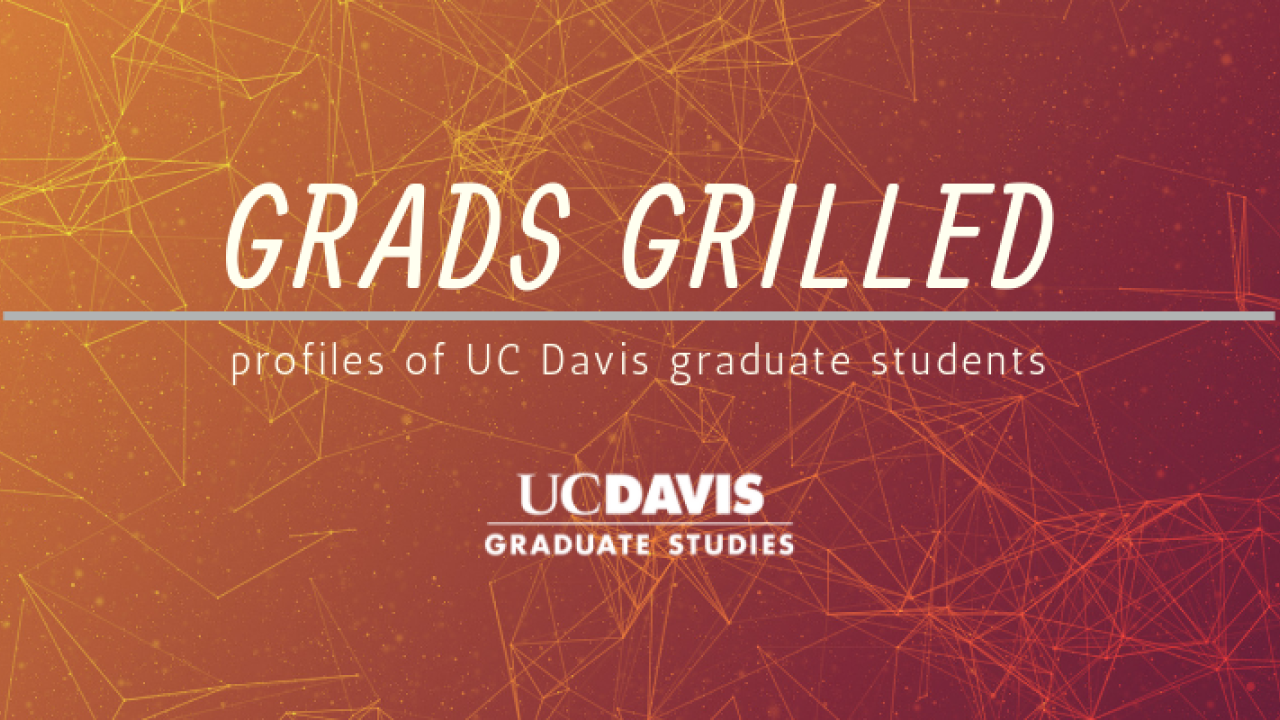
Graduate Student Profile: Mei-chun Lee, Anthropology
Meet UC Davis Graduate Student Mei-chun Lee
- Department
Anthropology
- Program and year of study
Ph.D., 5th year
- Previous degrees and colleges
BA Anthropology, National Taiwan University
MPhil Social Anthropology, University of Cambridge
- Where did you grow up?
Taipei, Taiwan
- Where do you live now?
Davis, CA
- What's your favorite spot in Davis?
The benches outside Dutton Hall, especially in the springtime
- How do you relax?
Playing volleyball with friends. I also like to do the housework and then enjoy a cup of tea in the nice, tidy room.
- What was the last book you read for pleasure?
她們的征途:直擊、迂迴與衝撞, 中國女性的公民覺醒之路 by Zhou Sile. It is a book about Chinese female activists and their resistance against the state machine.
- What TV show are you currently binge-watching?
The Handmaid’s Tale
- Research interests
I study digital activism, the hacker ethics, and the open government movement in Taiwan. I am also interested in the mediated body, the translation of data and digital images, and the technologies of governance.
- Dissertation title or topic
Hacking for an Open Government: Digital Activism in Post-Authoritarian Taiwan
- Please share a surprising or noteworthy fact or finding from your research
While hackers insist on the idea of openness as the principle of hacking, I find that the idea of openness is rather ambivalent and shifting according to contexts. I notice that producing one form of closure within the discourse of openness is a strategy of hackers to resist the state’s policing. The proliferation and ambiguity of openness create a space of dissensus for hackers to maneuver through political contingencies and maintain subversive potentialities of hacking
- Which professor or class inspired you to pursue graduate studies?
The Social Science Foundation of Anthropology, taught by Lin Kai-Shih, at National Taiwan University. I was deeply inspired by the way Lin traced the emergence of anthropology from the lineage of western philosophy and how he put this discipline back its socio-historical contexts. In the exploration of anthropology’s “pre-history,” I fell in love with its critical perspective and reflexive approach.
- Which scholarly text do you wish you had written? Why?
Bruno Latour’s short piece “The Berlin Key or How to Do Words with Things.” I always admire such a concise but intriguing way of making a theoretical argument. The piece is short but condensed, and it really shows the power of anthropological writing.
- What's the best thing about being a grad student?
UCD has a vibrant atmosphere of interdisciplinary dialogues and collaboration. I can enjoy the intellectual conversations by attending various kinds of talks and workshops. These interdisciplinary explorations open my eyes and enrich my research. As I have stopped taking classes after QE, these talks and workshops allow me to keep up with the latest studies and ideas.
- What's the worst?
Heavy TA workload. Each TA has around 65 students, and it is hard for us to interact with all students and give them substantial feedback on exams and assignments. Also, grading is so time-consuming that it always distracts me from my own work.
- If you weren't a grad student, what would you be doing?
I can do many things—activist, NGO worker, traveler, TV programmer, product manager, event coordinator…...just to name a few things I’ve done before. I don’t want to limit myself in certain kinds of job (with or without a PhD degree) and I have always tried to take new adventures in life. I would do whatever fits to my core values.
- Finally, please ask yourself a question - "How can your research contribute to the people & the place of your study rather than producing a work that just benefits your career?"
Unfortunately, I find that academic writings often fall into useless wordplay and serve to guard the hierarchy of knowledge. Engaged anthropology is what I try hard to uphold. It is also a reason that spending years in anthropology, a discipline that emerged from studying “the other,” I eventually chose a topic in my home country. I think no anthropologist can give a “right” answer to this question and it is actually a life-long process of thinking and rethinking about the ethics of research. Nevertheless, I keep in mind that researchers are not objective outsiders but actors who bring impacts and produce new connections and power relations. It is therefore very important for me to be aware of the politics of my positioning in doing fieldwork and writing ethnography.
Graduate student profile courtesy of the UC Davis College of Letters and Science.
About Graduate Studies
Graduate Studies at UC Davis includes over 100 dynamic degree programs and a diverse and interactive student body from around the world. Known for our state-of-the-art research facilities, productive laboratories and progressive spirit – UC Davis offers collaborative and interdisciplinary curricula through graduate groups and designated emphasis options, bringing students and faculty of different academic disciplines together to address real-world challenges.
UC Davis graduate students and postdoctoral scholars become leaders in their fields: researchers, teachers, politicians, mentors and entrepreneurs. They go on to guide, define and impact change within our global community.
For information on Graduate Studies’ current strategic initiatives, visit the Graduate Studies strategic plan page.
